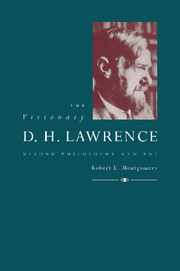Book contents
- Frontmatter
- Contents
- Acknowledgments
- 1 Introduction
- 2 Flesh, Word, and Holy Ghost: Lawrence and Schopenhauer
- 3 The passionate struggle into conscious being: Lawrence and Nietzsche
- 4 “A dry soul is best”: Lawrence and Heraclitus
- 5 The science of the soul: Lawrence and Boehme
- 6 Conclusion: Romanticism and Christianity
- Bibliography
- Index
4 - “A dry soul is best”: Lawrence and Heraclitus
Published online by Cambridge University Press: 08 January 2010
- Frontmatter
- Contents
- Acknowledgments
- 1 Introduction
- 2 Flesh, Word, and Holy Ghost: Lawrence and Schopenhauer
- 3 The passionate struggle into conscious being: Lawrence and Nietzsche
- 4 “A dry soul is best”: Lawrence and Heraclitus
- 5 The science of the soul: Lawrence and Boehme
- 6 Conclusion: Romanticism and Christianity
- Bibliography
- Index
Summary
COSMIC FIRE
Nietzsche existed for Lawrence as a kind of atmospheric presence diffused over many years and absorbed from many directions, a presence to which Lawrence's response was highly ambivalent. Heraclitus provides a complete contrast. We can identify with precision the moment and the place where Lawrence first encountered him, and there is no mistaking the nature of his reaction. The encounter occurred in July of 1915 in the pages of John Burnet's Early Greek Philosophy, which had been loaned to Lawrence by Bertrand Russell. The effect on Lawrence was electric - a classic instance of what Edmund Wilson called “the shock of recognition.” We have already seen his response: “I shall write out Herakleitos on tablets of bronze,” he exclaimed to Russell in a letter (2: 364). He wrote to Lady Ottoline Morrell, “I shall write all my philosophy again. Last time I came out of the Christian camp. This time I must come out of these early Greek philosophers” (2: 367).
Pre-Socratic thought in general struck Lawrence as a new revelation, but, as George A. Panichas observes in his essay on “Lawrence and the Ancient Greeks,” it is clearly Heraclitus of all the Greeks who is “closest in spirit to Lawrence” (341) and who made by far the greatest impression. It is Heraclitus whose influence is discernible in “The Crown”, on which Lawrence was working at the time, and it is Heraclitus whom Lawrence quotes in Women in Love, on which he was also working.
- Type
- Chapter
- Information
- The Visionary D. H. LawrenceBeyond Philosophy and Art, pp. 132 - 167Publisher: Cambridge University PressPrint publication year: 1994



